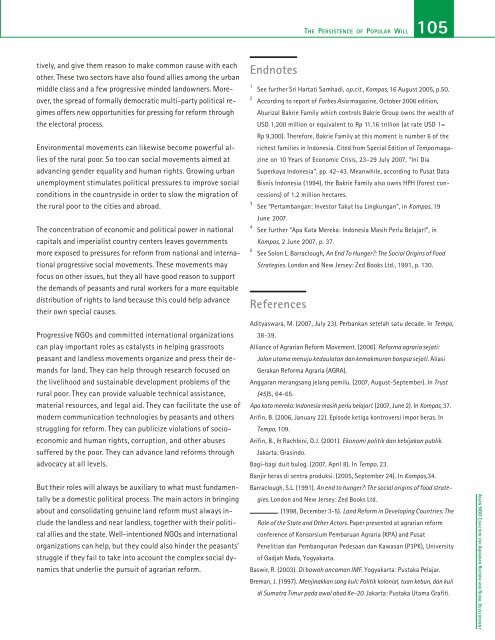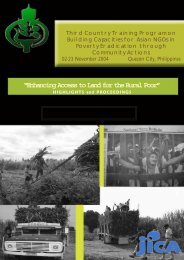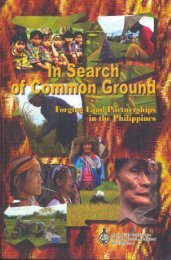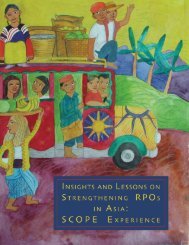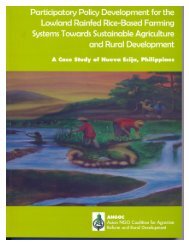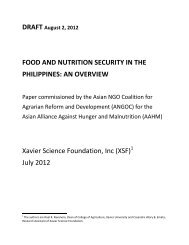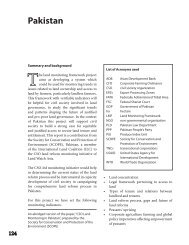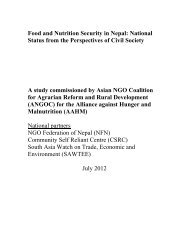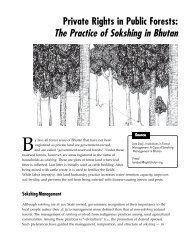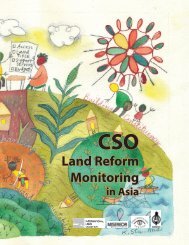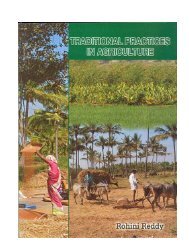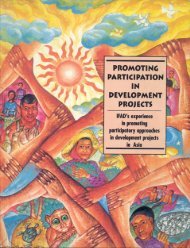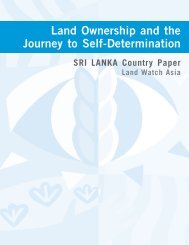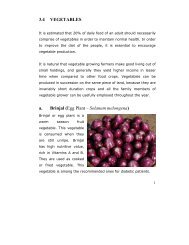Securing the Right to Land FULL - ANGOC
Securing the Right to Land FULL - ANGOC
Securing the Right to Land FULL - ANGOC
You also want an ePaper? Increase the reach of your titles
YUMPU automatically turns print PDFs into web optimized ePapers that Google loves.
tively, and give <strong>the</strong>m reason <strong>to</strong> make common cause with each<br />
o<strong>the</strong>r. These two sec<strong>to</strong>rs have also found allies among <strong>the</strong> urban<br />
middle class and a few progressive minded landowners. Moreover,<br />
<strong>the</strong> spread of formally democratic multi-party political regimes<br />
offers new opportunities for pressing for reform through<br />
<strong>the</strong> elec<strong>to</strong>ral process.<br />
Environmental movements can likewise become powerful allies<br />
of <strong>the</strong> rural poor. So <strong>to</strong>o can social movements aimed at<br />
advancing gender equality and human rights. Growing urban<br />
unemployment stimulates political pressures <strong>to</strong> improve social<br />
conditions in <strong>the</strong> countryside in order <strong>to</strong> slow <strong>the</strong> migration of<br />
<strong>the</strong> rural poor <strong>to</strong> <strong>the</strong> cities and abroad.<br />
The concentration of economic and political power in national<br />
capitals and imperialist country centers leaves governments<br />
more exposed <strong>to</strong> pressures for reform from national and international<br />
progressive social movements. These movements may<br />
focus on o<strong>the</strong>r issues, but <strong>the</strong>y all have good reason <strong>to</strong> support<br />
<strong>the</strong> demands of peasants and rural workers for a more equitable<br />
distribution of rights <strong>to</strong> land because this could help advance<br />
<strong>the</strong>ir own special causes.<br />
Progressive NGOs and committed international organizations<br />
can play important roles as catalysts in helping grassroots<br />
peasant and landless movements organize and press <strong>the</strong>ir demands<br />
for land. They can help through research focused on<br />
<strong>the</strong> livelihood and sustainable development problems of <strong>the</strong><br />
rural poor. They can provide valuable technical assistance,<br />
material resources, and legal aid. They can facilitate <strong>the</strong> use of<br />
modern communication technologies by peasants and o<strong>the</strong>rs<br />
struggling for reform. They can publicize violations of socioeconomic<br />
and human rights, corruption, and o<strong>the</strong>r abuses<br />
suffered by <strong>the</strong> poor. They can advance land reforms through<br />
advocacy at all levels.<br />
But <strong>the</strong>ir roles will always be auxiliary <strong>to</strong> what must fundamentally<br />
be a domestic political process. The main ac<strong>to</strong>rs in bringing<br />
about and consolidating genuine land reform must always include<br />
<strong>the</strong> landless and near landless, <strong>to</strong>ge<strong>the</strong>r with <strong>the</strong>ir political<br />
allies and <strong>the</strong> state. Well-intentioned NGOs and international<br />
organizations can help, but <strong>the</strong>y could also hinder <strong>the</strong> peasants’<br />
struggle if <strong>the</strong>y fail <strong>to</strong> take in<strong>to</strong> account <strong>the</strong> complex social dynamics<br />
that underlie <strong>the</strong> pursuit of agrarian reform.<br />
Endnotes<br />
THE PERSISTENCE OF POPULAR WILL<br />
105<br />
1<br />
See fur<strong>the</strong>r Sri Hartati Samhadi, op.cit., Kompas, 16 August 2005, p.50.<br />
2<br />
According <strong>to</strong> report of Forbes Asia magazine, Oc<strong>to</strong>ber 2006 edition,<br />
Aburizal Bakrie Family which controls Bakrie Group owns <strong>the</strong> wealth of<br />
USD 1,200 million or equivalent <strong>to</strong> Rp 11.16 trillion (at rate USD 1=<br />
Rp 9,300). Therefore, Bakrie Family at this moment is number 6 of <strong>the</strong><br />
richest families in Indonesia. Cited from Special Edition of Tempo magazine<br />
on 10 Years of Economic Crisis, 23–29 July 2007, “Ini Dia<br />
Superkaya Indonesia”, pp. 42–43. Meanwhile, according <strong>to</strong> Pusat Data<br />
Bisnis Indonesia (1994), <strong>the</strong> Bakrie Family also owns HPH (forest concessions)<br />
of 1.2 million hectares.<br />
3<br />
See “Pertambangan: Inves<strong>to</strong>r Takut Isu Lingkungan”, in Kompas, 19<br />
June 2007.<br />
4<br />
See fur<strong>the</strong>r “Apa Kata Mereka: Indonesia Masih Perlu Belajar!”, in<br />
Kompas, 2 June 2007, p. 37.<br />
5<br />
See Solon L. Barraclough, An End To Hunger?: The Social Origins of Food<br />
Strategies. London and New Jersey: Zed Books Ltd., 1991, p. 130.<br />
References<br />
Adityaswara, M. (2007, July 23). Perbankan setelah satu decade. In Tempo,<br />
38-39.<br />
Alliance of Agrarian Reform Movement. (2006). Reforma agraria sejati:<br />
Jalan utama menuju kedaulatan dan kemakmuran bangsa sejati. Aliasi<br />
Gerakan Reforma Agraria (AGRA).<br />
Anggaran merangsang jelang pemilu. (2007, August-September). In Trust<br />
(45)5, 64-65.<br />
Apa kata mereka: Indonesia masih perlu belajar!. (2007, June 2). In Kompas, 37.<br />
Arifin, B. (2006, January 22). Episode ketiga kontroversi impor beras. In<br />
Tempo, 109.<br />
Arifin, B., & Rachbini, D.J. (2001). Ekonomi politik dan kebijakan publik.<br />
Jakarta: Grasindo.<br />
Bagi-bagi duit bulog. (2007, April 8). In Tempo, 23.<br />
Banjir beras di sentra produksi. (2005, September 24). In Kompas,34.<br />
Barraclough, S.L. (1991). An end <strong>to</strong> hunger?: The social origins of food strategies.<br />
London and New Jersey: Zed Books Ltd.<br />
. (1998, December 3-5). <strong>Land</strong> Reform in Developing Countries: The<br />
Role of <strong>the</strong> State and O<strong>the</strong>r Ac<strong>to</strong>rs. Paper presented at agrarian reform<br />
conference of Konsorsium Pembaruan Agraria (KPA) and Pusat<br />
Penelitian dan Pembangunan Pedesaan dan Kawasan (P3PK), University<br />
of Gadjah Mada, Yogyakarta.<br />
Baswir, R. (2003). Di bawah ancaman IMF. Yogyakarta: Pustaka Pelajar.<br />
Breman, J. (1997). Menjinakkan sang kuli: Politik kolonial, tuan kebun, dan kuli<br />
di Sumatra Timur pada awal abad Ke-20. Jakarta: Pustaka Utama Grafiti.<br />
ASIAN NGO COALITION FOR AGRARIAN REFORM AND RURAL DEVELOPMENT


